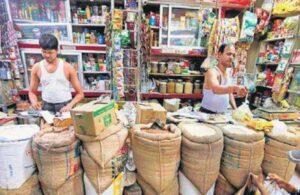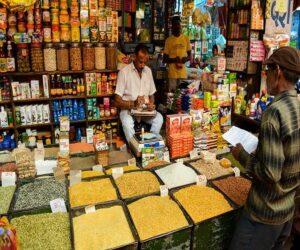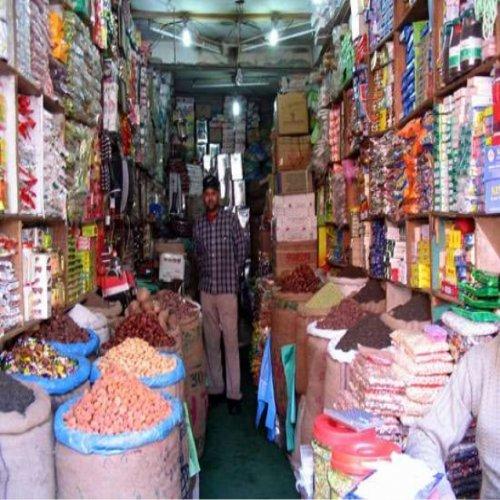Customer handwash, physical distancing boxes, home delivery for the elderly. Kirana stores have shouldered the responsibility of our collective health and kept our kitchens stocked through the lockdown. High demand, production lags and logistical constraints have upended the supply chain and made their job much harder, but they have risen to the occasion with new distribution strategies and product substitutions while operating under lockdown restrictions.
Of the six million or so kirana stores serving every corner of the country, only a fraction managed to do business, selling everything from potatoes to soap and pantry basics, their modest shopfronts defying the current dystopian creep to help people live in relatively normalcy. “For a customer walking into a shop, if he gets his atta and biscuits and soap, life feels normal.
 For us, nothing about the lockdown has been normal. We have run out of soap and oral rehydration solution. There is a shortage of shampoo and turmeric. And people are buying like never before,” says Srihari Vempati, a stockist for brands like GSK, Dabur, Bambino and Dettol in Dornakal, Mahabubabad district, Telangana. About 30 km from Khammam, Dornakal is a feeder market for over 150 thandas–Lambada settlements.
For us, nothing about the lockdown has been normal. We have run out of soap and oral rehydration solution. There is a shortage of shampoo and turmeric. And people are buying like never before,” says Srihari Vempati, a stockist for brands like GSK, Dabur, Bambino and Dettol in Dornakal, Mahabubabad district, Telangana. About 30 km from Khammam, Dornakal is a feeder market for over 150 thandas–Lambada settlements.
Vempati, who used to supply to 180 kiranas including 20 in Dornakal town, is no longer making delivery runs. “I ask stores to come and collect goods. Only half of them are able to. We are only allowed to remain open until noon, and I don’t have the time to make deliveries.” Having fully stocked up in March, he was able to pull through three weeks of lockdown, but his shelves have now emptied out. “I have been shouting at suppliers in Khammam and Hyderabad every day, even if there isn’t much they can do. Sanitisers sold out long ago. Thankfully, Himalaya has launched one for Rs 85. I am expecting 10 cases to arrive tomorrow.”
Shyam Sundar, the owner of Vasantha General Store in Dornakal, says where super stockists and state-level distributors for big brands have failed, local stockists like Vempati have risen to the challenge by managing inventory well and thinking outside the box. “We normally do Rs 30,000-40,000 of business in a day, but now that we are allowed to operate only between 6 am and 11 am, we do only a third of that,” Sundar says.
 Over and above the 8,000-odd residents of Dornakal, the town serves migrants and villages in the vicinity. But fears of community spread have prompted the local administration to set up check posts at entry points. “When an outsider wants to buy provisions, he has to make a list and give it to one of the seven or eight volunteers who are stationed at the check post. They do the shopping and deliver it to the customers,” he says.
Over and above the 8,000-odd residents of Dornakal, the town serves migrants and villages in the vicinity. But fears of community spread have prompted the local administration to set up check posts at entry points. “When an outsider wants to buy provisions, he has to make a list and give it to one of the seven or eight volunteers who are stationed at the check post. They do the shopping and deliver it to the customers,” he says.
Kirana owners have also pitched in to supply goods to the hundreds of agricultural labourers from Maharashtra who remain stranded in the chilli and cotton fields near Dornakal. “We have all been asked to fix prices and list them on a board. Onion cannot be sold for over Rs 20 a kg, sugar is fixed at Rs 40, tur dal at Rs 86 and garlic at Rs 120 a kg. The high school has been turned into a vegetable market with fixed prices and social distancing. So far, the system has worked well, aside from some shortage.”
Satyanarayana Veluguri, 41, says the problem is compounded by the fact that the demand for essentials has gone up while the supply chain is only fuctioning at half the capacity. Responsible for rural marketing for Hindustan Unilever in Khammam, Telangana, he has to cater to 350 kiranas across 12 mandals. But he has only two vehicles, three salesmen and five-to-six delivery executives on any given day.
“Delivery men are afraid to go to interior areas. I have been asking shops to pick up goods and also encouraging them to act as wholesalers for small kiranas in their area,” he says. Out of his 3.56 per cent commission, Veluguri passes on 0.7 per cent–the transport cost–to stores as an upfront discount. Under the new distribution model, 89 stores have been picking up goods from him regularly, with many of them also retailing to smaller stores.
Atta, salt, tea and washing powder are the top sellers, he says. “I sell about 400 bags of atta in a month. This time I sold out in a week.” Logistics is an issue even though the government has assured smooth movement of essentials. One of Veluguri’s delivery workers got beaten up by police, and the company’s tertiary sales officer who was on a visit from Khammam to make changes in the system had his vehicle seized while out on a trip to crowdsource food for migrants and policemen.
One of the companies that has helped kiranas in south India stay agile is StoreKing, a technology-enabled distribution platform for rural stores. An inventory-led company, StoreKing operates eight warehouses–in Bangalore, Coimbatore, Vijayawada, Hyderabad, Nagpur, Bhiwandi and Indore, out of which only the last has remained shut during the lockdown period–and works with 16,000 kiranas. Kirana owners can place orders for FMCG, personal care goods and packed food items on the StoreKing app, and expect delivery in a couple of days, thereby drastically reducing stocking time and working capital needs.
“We had a 30 per cent share of their wallets before the lockdown but it has been rising steadily now,” says Sridhar Gundaiah, founder and CEO, StoreKing. Using conventional distributors as logistics hubs, StoreKing works via master franchise dealers who are responsible for last-mile delivery. “Inter-district operations haven’t been a problem, but inter-state trucks are only plying between Andhra and Telangana and between Coimbatore and Kerala as of now.” The big limitation has been stocks. “We reached our monthly volumes of Rs 40 crore in just 14 days. The demand has been phenomenal, partly because of the migrant population that has already made its way home,” he says.
Tirupati Thogari, a 37-year-old kirana owner from Mancherial, Telangana, says his daily business has doubled under lockdown–from Rs 20,000-25,000 before to Rs 40,000-50,000. “There are 50-60 kirana stores in Mancherial and only 10-15 have remained open during lockdown. So there is more business for us now,” Thogari says. He has relied almost entirely on StoreKing for FMCG, snacks, and personal and home care goods stocks.
Every morning at 6am, Thogari puts on a mask and walks to his shop, Sri Veeranjaneya Stores, about a km away. “I shut shop by 11 am and take an inventory of goods to place orders for. People are buying twice the amount they were buying before–and I have to anticipate demand accordingly.” Hot sellers at his store include Santoor soap, Red Label tea and Goodday biscuits. “StoreKing’s prices are usually 2 per cent higher, but it is worth paying a premium for the reliable distribution chain,” he says. “I no longer have to plead with a dozen distributors.”
StoreKing stocks 350 well-known brands and 280 local or unknown brands, and the latter have filled gaps in the supply chain. “Regional brands that don’t declare financials or even file GST account for 50 per cent of consumption in rural India. They never make it to the big consumer surveys. For instance, there is brand of detergent that sells only in Davanagere, Chitradurga and Shimoga districts, called Sundari Soaps.
Their turnover is Rs 2 crore a month and they compete with Wheel and Rin. Their EBITDA is a whopping 40 per cent. They have introduced coloured soap bars that don’t dissolve in a bucket of water for days together. This is a good time for such businesses to ramp up and we hope to be a platform connecting them with retailers,” Gundaiah says. StoreKing is about to launch Re. 1 sachets of sanitiser by Chik, the CavinKare brand that pioneered the shampoo sachet. In the aftermath of Covid-19, local and regional brands could well spring to success, carving a bigger slice of the kirana pie for themselves. #KhabarLive








[…] Source link […]
Comments are closed.